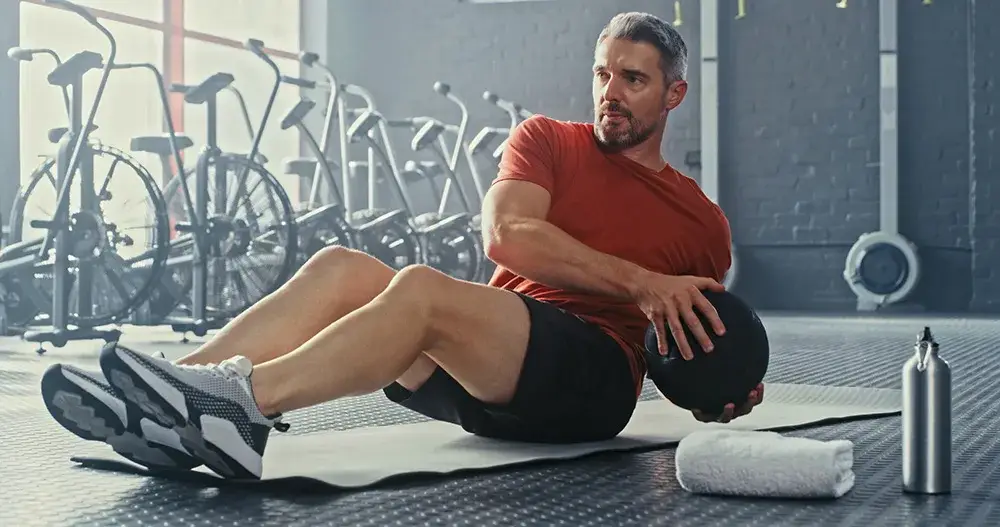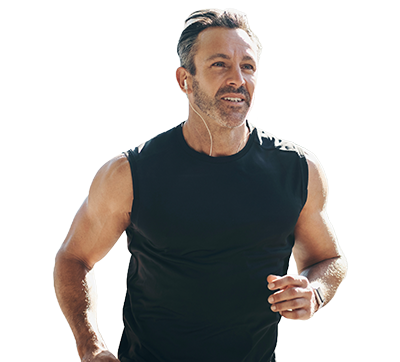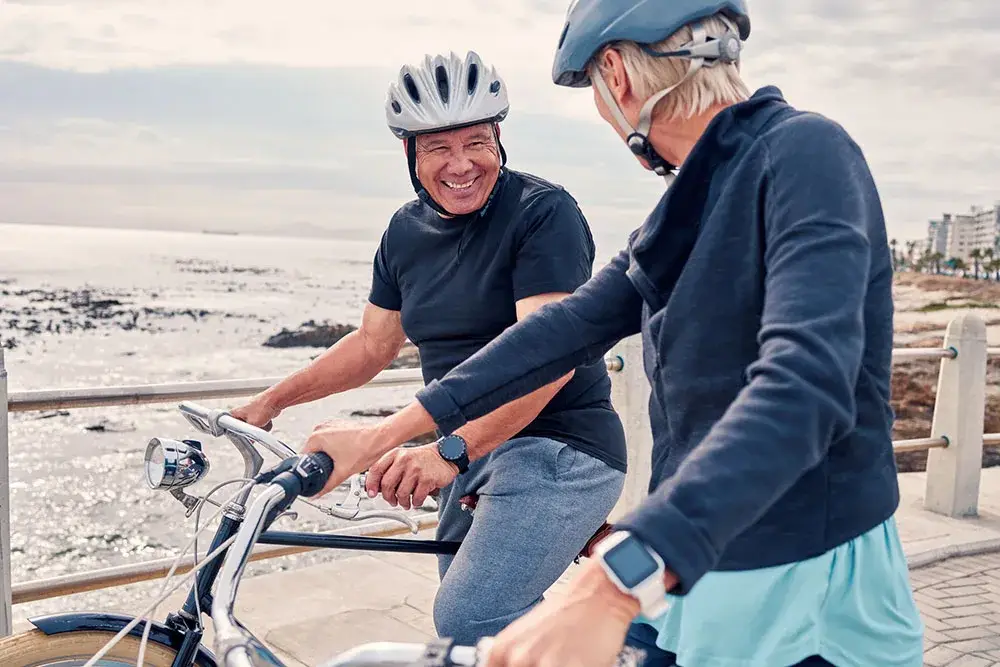As we age, our bodies undergo various changes, including hormonal fluctuations and declines in physical function. Hormone replacement therapy (HRT) and exercise are two powerful tools that can help mitigate these changes and promote healthy aging, especially when combined.
Let’s explore the interplay between HRT and exercise, the benefits of combining the two for healthy aging, and practical strategies for incorporating both into your lifestyle.
What is HRT and How Does it Impact Exercise?
Hormone replacement therapy (HRT) is a medical treatment that involves supplementing or replacing hormones that are deficient or imbalanced in the body. HRT is commonly used to alleviate symptoms associated with hormonal changes, such as those experienced during menopause or andropause (male menopause). The primary hormones involved in hormone replacement therapy include estrogen, progesterone, and testosterone.
Hormone replacement therapy can have several effects on exercise performance and physical fitness:
Muscle Mass and Strength: Testosterone, in particular, plays a significant role in regulating muscle protein synthesis and muscle growth. Testosterone replacement therapy in men with low testosterone levels can help increase muscle mass, strength, and power output, which may enhance exercise performance and physical function.
Bone Density: Estrogen is essential for maintaining bone density and preventing osteoporosis. Estrogen replacement therapy in postmenopausal women can help reduce the risk of fractures by preserving bone mass and strength, which is particularly important for exercises that involve weight-bearing activities.
Metabolism and Body Composition: Hormone replacement therapy can influence metabolism and body composition by affecting fat distribution, muscle mass, and energy expenditure. Estrogen and testosterone replacement therapy may help regulate body weight, reduce fat accumulation, and increase lean body mass, which can impact exercise performance and overall fitness.
Libido and Motivation: Testosterone plays a crucial role in regulating libido, mood, and motivation. Testosterone replacement therapy in men with low testosterone levels can help improve libido, mood, and motivation, which may positively affect exercise adherence and performance.
Cardiovascular Health: Estrogen replacement therapy in postmenopausal women has been associated with improvements in cardiovascular risk factors, such as cholesterol levels, blood pressure, and arterial stiffness. These cardiovascular benefits may enhance exercise tolerance and cardiovascular fitness.
Recovery and Injury Prevention: Hormone replacement therapy can influence recovery from exercise and injury by promoting tissue repair and regeneration. Estrogen and testosterone replacement therapy may help accelerate recovery from exercise-induced muscle damage and reduce the risk of musculoskeletal injuries.

How Does Exercise Affect HRT?
Exercise can have a significant impact on hormone levels in the body, including those affected by hormone replacement therapy. Regular physical activity has been shown to increase endorphin levels, reduce stress hormones such as cortisol, and improve insulin sensitivity. These hormonal changes can complement the effects of HRT and enhance overall well-being.
For individuals undergoing hormone replacement therapy, exercise can help optimize the benefits of treatment by promoting cardiovascular health, maintaining muscle mass, and supporting bone density. Additionally, exercise may help alleviate some common side effects of HRT, such as weight gain and mood changes, by promoting a healthy body composition and enhancing mood.
What Exercises Are Good for Hormone Replacement Therapy?
While most exercise is a good thing, regardless of the specific exercise, there are some that we like to recommend. A well-rounded exercise routine that includes a combination of cardiovascular, strength training, and flexibility exercises is beneficial for individuals undergoing hormone replacement therapy. Here are some specific types of exercises that go well with HRT treatments:
Cardiovascular Exercise: Aerobic activities such as walking, jogging, cycling, swimming, and dancing are excellent choices for promoting cardiovascular health and endurance. Aim for at least 150 minutes of moderate-intensity aerobic exercise or 75 minutes of vigorous-intensity exercise per week, as recommended by the American Heart Association.
Strength Training: Resistance training exercises using free weights, resistance bands, or weight machines are essential for preserving muscle mass and strength, which can decline with age and hormonal changes. Focus on compound exercises that target multiple muscle groups, such as squats, lunges, deadlifts, chest presses, and rows.
Flexibility and Mobility Work: Stretching exercises can help improve flexibility, range of motion, and joint health, reducing the risk of injury and enhancing overall mobility. Incorporate dynamic stretches, static stretches, and mobility drills into your routine to maintain suppleness and prevent stiffness.
Balance and Stability Training: Balance and stability exercises are crucial for preventing falls and maintaining functional independence as we age. Include exercises such as single-leg stands, heel-to-toe walks, and balance exercises on unstable surfaces (e.g., Bosu ball, balance board) to challenge your equilibrium and proprioception.

Is HRT Safe for Building Muscle?
Hormone replacement therapy, particularly testosterone replacement therapy (TRT) in men, has been shown to increase muscle mass and strength, making it a valuable tool for individuals looking to build and maintain muscle as they age. Testosterone plays a key role in regulating muscle protein synthesis, muscle fiber size, and muscle function, and declining testosterone levels can contribute to age-related muscle loss and weakness.
When used under the supervision of a healthcare provider and in appropriate doses, HRT can be safe and effective for building muscle in individuals with hormone deficiencies. However, it is important to undergo a thorough physical evaluation and regular monitoring to ensure that hormone levels are optimized and potential side effects are minimized.
Ways to Maintain Healthy Aging through HRT and Exercise
Combining hormone replacement therapy with regular exercise can provide synergistic benefits for healthy aging. Here are some ways to maximize the benefits of HRT and exercise for optimal aging:
Customized Hormone Therapy: Work with a knowledgeable healthcare provider to develop a personalized hormone replacement therapy plan tailored to your individual needs, hormone levels, and health goals. Monitor hormone levels regularly and adjust treatment as necessary to optimize outcomes and minimize risks.
Consistent Exercise Routine: Establish a regular exercise routine that includes a variety of cardiovascular, strength training, flexibility, and balance exercises. Aim for at least 150 minutes of moderate-intensity aerobic exercise, two or more days of strength training per week, and daily flexibility and balance exercises.
Progressive Overload: Gradually increase the intensity, duration, and frequency of your workouts to challenge your body and stimulate adaptation. Incorporate progressive overload principles into your strength training routine by gradually increasing the resistance, sets, and repetitions over time.
Rest and Recovery: Allow adequate time for rest and recovery between workouts to prevent overtraining and promote muscle repair and growth. Listen to your body and adjust your exercise intensity and volume as needed to avoid burnout and injury.
Healthy Nutrition: Support your hormone therapy and exercise regimen with a balanced diet rich in lean protein, fruits, vegetables, whole grains, and healthy fats. Stay hydrated, limit processed foods, and avoid excessive alcohol and caffeine intake, which can negatively impact hormone levels and recovery.
Stress Management: Practice stress-reducing techniques such as deep breathing, meditation, yoga, or tai chi to manage cortisol levels and promote relaxation and overall well-being. Prioritize sleep hygiene to ensure restorative sleep, which is essential for hormone regulation, recovery, and muscle repair.
Regular Monitoring: Stay proactive about your health by monitoring your progress, tracking changes in hormone levels, and addressing any concerns or side effects with your healthcare provider. Regular follow-up appointments and health screenings can help identify and address any issues early on.
Hormone replacement therapy and exercise are powerful tools for promoting healthy aging and optimizing quality of life. By combining HRT with a tailored exercise regimen, individuals can enhance muscle mass, bone density, cardiovascular health, and overall well-being. Consult with a hormone specialist at Blue Sky MD and fitness professional to develop a comprehensive plan that addresses your individual needs, goals, and preferences for healthy aging through HRT and exercise.
Get started by contacting us today or scheduling your initial lab appointment at Blue Sky MD through our online portal.

Dr. David LaMond, MD
Medical Director
Dr. David LaMond is the founder and Medical Director of Blue Sky MD. He has been a the forefront of hormone therapy and weight loss since 2008. Drawing from his foundation and board certification in Family Medicine, he has created the core medical principles behind the Blue Sky MD concept of total patient care. He is an active member of the American Society of Bariatric Physicians, American Society of Laser Medicine and Surgery and American Academy of Family Physicians.
North Carolina’s #1 TRT CLINIC
Since 2008, we’ve been at the forefront of TRT in North Carolina. Learn more about our life-changing testosterone therapy program for men.




